Masada: Arms and the Man
058
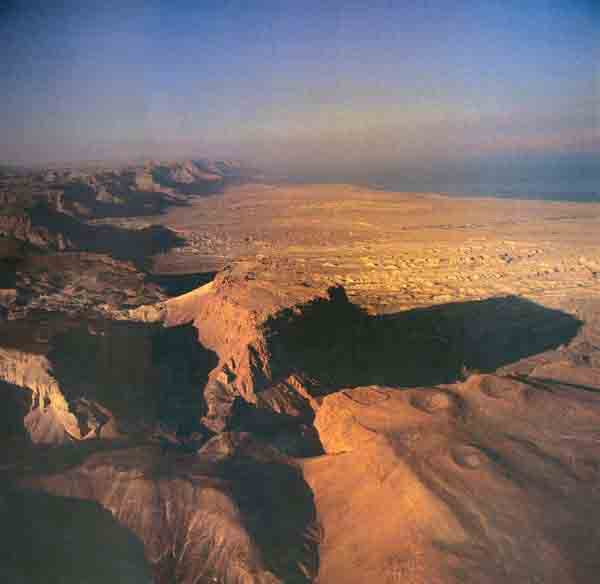
Sometimes we make discoveries not by digging in the ground, but by digging in the records of past excavations. So it is with Masada, Herod’s nearly impregnable palace-fortress in the Judean wilderness, occupied and defended by Jewish Zealots during the First Jewish Revolt against Rome. Masada was excavated in the 1960s by Israel’s most illustrious archaeologist, Yigael Yadin. It was a massive effort mobilizing hundreds of volunteers from all over the world. Yadin died in 1984, his final report still incomplete. Led by archaeologist Ehud Netzer, a team of scholars has taken up the task of analyzing the vast number of finds uncovered during Yadin’s three full years of digging.
In the BAR 17:06, Netzer 060looked at Yadin’s records and observed puzzling patterns of conflagration in the buildings on the mountain.a With the aid of Josephus’ accounts of the fall of Masada, Netzer proposed a new understanding of how the Jewish defenders—during their desperate last days—scavenged the buildings on Masada to build a wood-and-earth reinforcement wall to withstand the war machines of the Roman army.
I was asked to undertake a study of a different aspect of the military situation at Masada—the arms and armor discovered at the site.1 This large and diverse group of arms and armor includes arrowheads and arrow shafts, armor scales, shields, swords, spears, javelins, iron points and a scabbard chape (the tip of a sword sheath). All of these weapons have a story to tell. Sometimes they solve puzzles. Sometimes they create them. They almost always raise more questions than they answer.
Take, for example, the arrowheads. Hundreds and hundreds of them were found all over the site. We can’t really tell how many there were because so many of them, badly corroded, have disintegrated into small fragments.

More than 200 largely intact arrowheads along with the remains of some arrow shafts were found in two rooms in the western palace, designated as 442 and 456. Both rooms are located in the “royal wing” of the palace, which contains the “throne room” and an adjacent bathhouse. Many readers may be familiar with room 456, for its southern half is paved with an elaborate (now partially destroyed) mosaic floor that visitors to Masada are often shown. I first became interested in these rooms because they contained the largest concentrations of arrowheads at Masada.

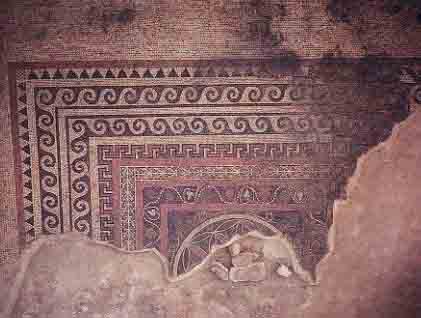
What were all these arrowheads doing here?
To try to find out, I combed through the records from the excavation. As at most excavations, locus cards were kept at Masada. A locus is a room, a pit, a part of a room or almost any other kind of archaeological feature. Most of the loci at Masada were rooms, like 442 and 456. Locus cards are usually filled out by the area supervisor after the excavation of the locus has been completed. They tend to be synthetic, leaving out details. So I tried to get behind the locus cards—to dig deeper, as it were.
I tracked down the daily records for rooms 442 and 456, the description of the work while it was in progress, and came across an unexpected source of information. During the excavation, Yadin convened his area supervisors at the end of each work day to discuss their daily progress and strategy. Many of these area supervisors are now well-known archaeologists, some of whom were my professors when I was an undergraduate at Hebrew University. Unlike any other excavation I am familiar with, however, Yadin tape recorded these daily meetings. The recordings have since been transcribed, and they are preserved among the notes and records from the excavation.
By reading the transcriptions from the time of the excavation of rooms 442 and 456, I could understand Yadin’s thoughts, for it was he who was speaking. It is clear from these records that Yadin’s interpretation of the arrowheads and associated remains was influenced by Josephus’ history of the Roman siege of Masada. Josephus tells us that the Zealots set fire to everything but their stores of food before committing suicide, in order to prevent the supplies from falling into Roman hands and to demonstrate that they did not starve but chose to die as free people.2 To Yadin the remains in rooms 442 and 456 represented piles of arrows that the Zealots had set on fire just before committing suicide. This is the “official” interpretation that was adopted in Yadin’s lifetime.3 But this interpretation didn’t square with the context in which these particular arrowheads were found.
My review of the excavation records revealed that the arrowheads in rooms 442 and 456 had been discovered together with a large quantity of charcoal, iron fragments, iron slag and arrow shafts. These remains lay in the center of hearths—clearly associated with the Zealot occupation level—that were each about 18 inches in diameter. The hearth in room 456 was located in the northern half of the room, opposite the mosaic floor.4 The intensity of the heat from the hearths had whitened the areas surrounding them; an ordinary destruction fire would not be sufficient to create this effect. Moreover, Yadin’s interpretation did not account for the hearths, the charcoal, the iron fragments and the pieces of slag found together with the arrowheads.
At this point, I returned to the locus cards for rooms 442 and 456. Amnon Ben-Tor, now the Yigael Yadin Professor of Archaeology at the Hebrew University, had been the area supervisor in the western palace at the time of the excavation. On his locus cards, he had suggested that these two rooms were actually workshops or smithies (fabricae) for the forging of iron arrowheads. Ben Tor was right; here was where Masada’s defenders actually manufactured the arrowheads to shoot at their Roman attackers.
My further study of the technology of ancient iron smithing has since confirmed Ben Tor’s interpretation of the archaeological evidence made nearly 30 years 063ago. The manufacture of iron objects is a two-stage process.5 First, the iron ore must be extracted from its source through the process of smelting, which extracts the metal from its ore by heating beyond the melting point in the presence of oxidizing or reducing agents. This yields a lump of iron mixed with slag and charcoal called a bloom. It is the bloom that is worked by the smith. The second stage of the ironworking process, smithing, is much simpler than smelting. The smith only needs to have a bellows, a tuyere (a conical clay object to hold the tip of the bellows and to focus the blast of air) and a pile of charcoal. The smithing furnace, unlike the smelting furnace, does not have to be dug into the ground or covered. Once the pile of charcoal is ignited and fanned with air from the bellows, the bloom is placed among the charcoal near the tuyere. A heat of up to 1,200° centigrade (2,192° Fahrenheit) can be reached in this type of forge. During the process of working the bloom, the iron is extracted, leaving the slag as a by-product or refuse.
The hearths, the charcoal, the arrowheads and arrow shafts, the pieces of slag and the scraps of iron in rooms 442 and 456 provide clear evidence for iron smithing. In addition, an iron tool with one flat face and one pointed end, which may be a smith’s hammer, was found in locus 448, the room located between 442 and 456.
Why did the Zealots choose these two rooms as the site of their iron workshops, especially 456 with its mosaic floor? I believe that it was because of their proximity to the bathhouse and its water supply in this part of the palace.
These arrowheads can almost certainly be identified as Zealot supplies—manufactured, but never used. But we could not tell this from the arrowheads themselves, only from the context in which they were found. All the arrowheads—with one exception to be discussed—were of the same design: three-winged (trilobate) in section, with barbed wingtips and a tang that fit into a hole in a wooden shaft. They range in length from about .5 inch to about 2 inches, and in width from about .5 to .75 inch at the tip of the barbs. They vary so much in size because arrowheads were individually forged, not manufactured in molds. And we may be sure from the literature on Roman armies that they had their own smithy at the base of the mountain-fortress making arrowheads for them, as well as repairing their other weapons.
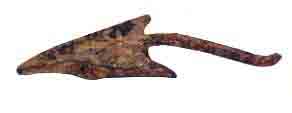
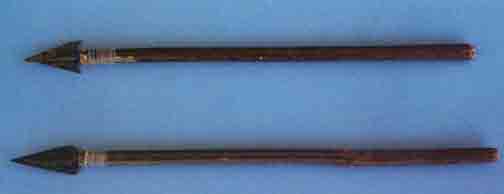
All of these arrowheads are rather light (between .05 and .35 ounces). This suggests that they were all probably fired from manually powered bows instead of from catapults with torsion (machine-powered) bows.
Several years ago, one of the arrowheads from Masada, found in a group of 80 on the lowest terrace of the northern palace, was subjected to laboratory analysis. The result was unexpected.6 It turned out that this arrowhead had not been hardened by quenchingb or by tempering.c The arrowhead is therefore fairly soft. Unfortunately, this was the only arrowhead tested in this way, so we don’t know whether or not it is representative. My suspicion is that it is. Many of the arrowheads do not seem to be of very high quality. The fact is that the technical level of smithing in the Roman period was low and quench-hardening of arrowheads was not widely practiced.
But how effective would a soft arrowhead like this be? It could certainly kill an animal or a human protected only by leather. In this connection, we did find the remains of at least two leather-and-wood shields—a rare find because of the perishable nature of the material. But we also found hundreds of bronze scales from scale armor (Latin, lorica squamata). The bronze scales were attached to a fabric backing to form a corselet or waistcoat that extended down to about the hips. The scales were cut from cast sheet metal and came in four basic sizes and designs. Most of the scales have four holes in a square and are strengthened by a raised medial rib and border. As with the arrowheads, however, it is impossible to tell which of the various scale designs and sizes belonged to the Romans and which belonged to the Jews. It is most 064likely that both sides protected themselves with scale armor. Over 650 scales were found in one cistern; 430 were found on the lowest terrace of the northern palace.
These scales tell us something about the likely composition of the Roman forces. The Roman army consisted of two kinds of troops: the legions and the auxiliary troops. The legions were composed of soldiers recruited mainly from among Roman citizens in Italy, although by the end of the first century C.E. an increasing number of legionaries came from the provinces as well. These provincial recruits were non-Roman citizens by birth, but they were given Roman citizenship and Latin names upon their enlistment. (The enlistment period was 25 years.) Each legion consisted of between 5,000 and 6,000 men, divided into ten smaller units called cohorts.
The auxiliary troops were conscripted, non-Roman forces; they were much more lightly armed, and included skilled archers (sagitarii). The term auxilia reflects the origin of these troops as aids to the citizen legionaries. They acted as the legions’ light cavalry and infantry.
Legionaries and auxiliary troops were equipped quite differently. The typical legion infantry soldier at the time of the fall of Masada would be equipped with heavy military boots or sandals (caligae), metal or leather body armor (lorica), a bronze helmet with an iron skull-plate (cassis) and a large, rectangular shield (scutum) that was curved to fit the body. His offensive equipment would consist of a type of spear called a pilum, a gladius or “Spanish sword” and a dagger (pugio). He would carry his shield in his left hand and a pilum in his right. The pilum was a pointed spear with a long tang set into a wooden shaft. At the beginning of a military engagement, the legionaries would hurl their pila at the enemy, and then use their swords in hand-to-hand combat. The sword, which was over 2 feet long, was carried in a sheath or scabbard worn high up on the right-hand side of the body, so as to be clear of the legs and the shield arm. It was withdrawn from the sheath in an upward movement and thrust forward like a bayonet. The dagger was attached to a belt on the left-hand side of the body.


The legionaries were obviously quite weighted down. Not so the auxiliary—the light mobile troops. Since they were from the provinces, their equipment was much less standardized. Characteristic types of auxiliary weapons included a broad thrusting-spear (hasta), a long, narrow-bladed lance (lancea) and a sword (spatha) that was longer and narrower than the legionary’s gladius. At least some of the auxiliaries wore shirts of scale armor and helmets. Their oval shields were smaller and lighter than those of the legionaries. They also wore the heavy military boots or sandals, and carried daggers. Some of the mounted auxiliaries carried a light lancea that could be thrown from a distance.
Archers were auxiliaries. Most of them came from the eastern provinces, where the native nomadic peoples had a long tradition of mounted warfare and archery.
The soft arrowheads from Masada indicate that there was a major contingent of auxiliary troops at Masada and/or that the Zealots had armed themselves in the manner of auxiliaries, with bows and arrows. The hundreds of metal scales found at the site suggest that the auxiliaries were protected by armor of this kind. Scale armor is more typical of auxiliaries than legionaries, who often wore segmented cuirasses (chest armor) and chain mail. In Roman reliefs from the mid-first century C.E. onward, scale armor is usually associated with auxiliaries.
The plethora of arrowheads and armor scales may be contrasted with the surprising paucity of the kind of weapons that would have been used by the legionaries, who apparently confined themselves principally to working the large siege machines7 that eventually climbed the ramp and set the fortress afire, as described in Ehud Netzer’s article.
No chain-mail armor was found. No segmented armor was found. At least three iron swords were found, but in such a poor state of preservation that we can’t even determine their original form. A fourth, better-preserved sword, about 2 feet long, is flat with no medial rib. It is probably a spatha (long sword), a weapon used mainly by auxiliaries.
Strangely, the excavators seem to have found no projectile points of the kind that would have been shot by legionaries from torsion bows. Projectile points are much larger and heavier than the iron arrowheads that were found in abundance. The absence of projectile points at Masada is in contrast to the situation at Gamla, another site attacked and destroyed earlier in the First Jewish Revolt,d where numerous projectile points were uncovered. The few metal objects that could possibly be identified as projectile points at Masada were not found on the Roman ramp side of the site, but on the other side. Moreover, they were 066found in a context with other weapons belonging to the Zealots. In my opinion, these metal objects were not projectile points at all, but points that fit onto the wooden end of spears so they could be stood upright in the ground. The mystery of the absence of projectile points at Masada remains.
One piece of fancy equipment that we did find was a chape, the metal tip of a leather sword sheath. This probably belonged to a legionary officer. The sword sheath may have been booty taken by the Zealots after a skirmish with Roman troops.
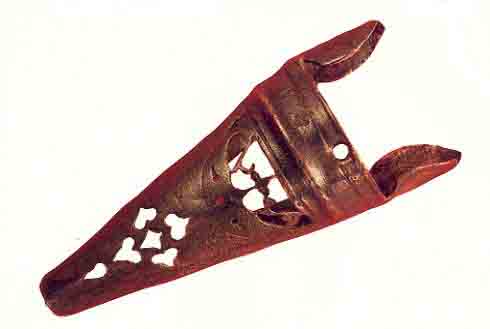
Another elegant find—among the scale armor from the northern palace—was the remains of what must have been parade scale armor. The deluxe metal scales were of different colors—silvery, red and gold—obtained by deliberately mixing different proportions of alloys to make the bronze. One is tempted to attribute this parade armor to an officer of the Roman legion. But the context in which it was found makes it clear that this was part of the equipment of the Jewish defenders: It was found with other items that were used by the Zealots, including arrows, arrowheads, an ostracon with Hebrew letters and a prayer shawl (tallith).
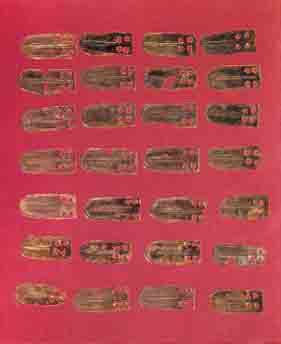
Of all the hundreds of arrowheads found at Masada, one was different: a bronze trilobate arrowhead with a socket into which a wooden shaft was inserted. Sometimes called a Scythian arrowhead, this type generally dates to an earlier time than the barbed iron trilobate arrowheads with tangs. Bronze trilobate arrowheads with sockets have been found in Israel at the northern coastal site of ‘Atlit and in the Citadel in Jerusalem in contexts dating to the Persian and Hellenistic periods (sixth to first centuries B.C.E.). Perhaps the one found at Masada also comes from an earlier period, although it was uncovered in a clearly Zealot context. It may have been brought to Masada by the Hasmoneans (who originally fortified the site in the second century B.C.E.), or by Herod. In any event, it saw its last use at the time of the revolt against the Romans.
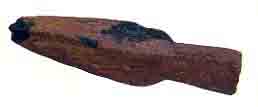
Around the mountain’s base, the Romans had constructed a circumvallation wall. The steep and winding Snake Path on the eastern side of the mountain, the main route to the top, was unsuitable for an assault with heavy artillery. The Roman commander, Flavius Silva, ordered his forces to construct a huge ramp with a more gradual slope on the western side of the mountain. Artillery machines stationed on top of the small hill (called the “white promontory” by Josephus) at the foot of the western side of Masada provided covering fire for the soldiers engaged in the ramp’s construction. When the ramp was completed, the full assault got underway.
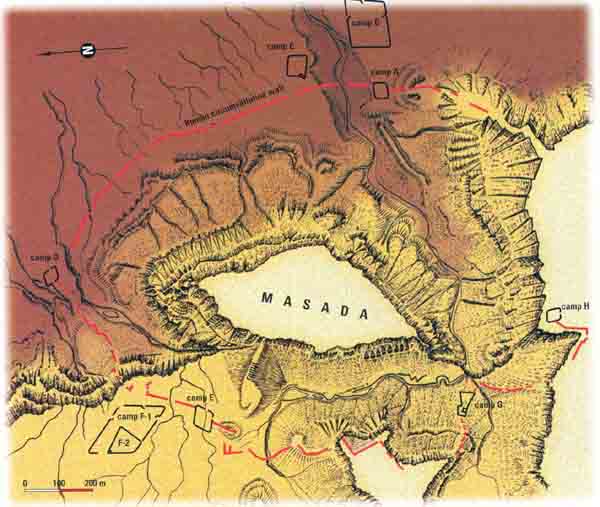
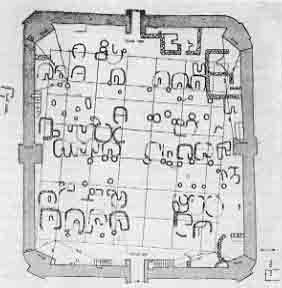
The different kinds of artillery machines used by the Romans are referred to as catapults and ballistas by ancient writers, though the distinction between them is not always clear. One type was a huge, stone 067throwing engine, used to make holes in the walls and towers surrounding a fortress and to drive the defenders from the walls. The other type was a smaller machine that operated a torsion bow. These bows fired large, iron-headed projectiles, sometimes called darts, that provided covering fire for the advancing forces. As we have seen, none of these projectiles was found in the excavation. However, a large number of stones of various sizes thrown by these machines were discovered on top of Masada. Perhaps Josephus’ mention of darts was simply formulaic.
Under covering artillery fire, the Roman forces dragged the battering ram up the ramp and broke through the wall that Herod had constructed around the top of the mountain. The Roman auxiliary archers added covering fire to that of the machines as the forces ascended the ramp. The Zealots certainly returned the fire with everything at their command, including bows and arrows manufactured during the last days of the siege of Masada. After the Romans set fire to the reinforcement wall of wooden beams and earth hastily constructed by the Zealots opposite the top of the ramp, it became apparent that the fall of the site was imminent. Once the wall was breached, the Zealots could not withstand the Roman onslaught and all their defensive preparations came to nought—except for the memory of their bravery.
Sometimes we make discoveries not by digging in the ground, but by digging in the records of past excavations. So it is with Masada, Herod’s nearly impregnable palace-fortress in the Judean wilderness, occupied and defended by Jewish Zealots during the First Jewish Revolt against Rome. Masada was excavated in the 1960s by Israel’s most illustrious archaeologist, Yigael Yadin. It was a massive effort mobilizing hundreds of volunteers from all over the world. Yadin died in 1984, his final report still incomplete. Led by archaeologist Ehud Netzer, a team of scholars has taken up the task of analyzing the vast […]
You have already read your free article for this month. Please join the BAS Library or become an All Access member of BAS to gain full access to this article and so much more.
Already a library member? Log in here.
Institution user? Log in with your IP address or Username
Footnotes
Ehud Netzer, “The Last Days and Hours at Masada,” BAR 17:06.
Quenching: rapid cooling of steel in water or some other liquid, which greatly increases the strength but induces brittleness.
Tempering: moderate reheating of quenched steel (to temperatures below 727° C.) to reduce the brittleness caused by quenching.
See Danny Syon, “Gamla: Portrait of a Rebellion,” BAR 18:01.
Endnotes
I am grateful to Dr. Ehud Netzer and Professor Gideon Foerster of the Hebrew University of Jerusalem, and Joseph Aviram of the Israel Exploration Society, for their permission and encouragement to publish this article. My report on the arms and armor from Masada will appear in Masada, The Yigael Yadin Excavations 1963–1965, Final Reports, Vol 5, ed. J. Aviram, G. Foerster and E. Netzer (Jerusalem: Israel Exploration Society, forthcoming). The ballista stones will be published in the same volume by Andrew E. Holley.
Yigael Yadin, Masada (New York: Random House, 1966), p. 97: “The weapons of the Zealots, who used mainly bows and arrows were discovered by us in many locations on Masada. We found hundreds of arrows in such places as the middle terrace of the palace-villa, the western palace and elsewhere, literally in heaps where they had been piled and intentionally set on fire.” However, in his preliminary excavation report (“The Excavation of Masada 1963/64, Preliminary Report,” Israel Exploration Journal [IEJ] 15 [1965]), pp. 61–64, Yadin alludes to Zealot workshops in the western palace.
See Yadin, “Excavation of Masada,” where he incorrectly states that the arrowheads were found “in the eastern part of the mosaic” (p. 62).
The main reference for this section is R.F. Tylecote, “Furnaces, Crucibles, and Slags,” in The Coming of the Age of Iron, ed. T.A. Wertime and James D. Muhly (New Haven, CT: Yale Univ. Press, 1980), pp. 183–228.
See R. Knox et al., “Iron Objects from Masada: Metallurgical Studies,” IEJ 33 (1983), pp. 97–107.
